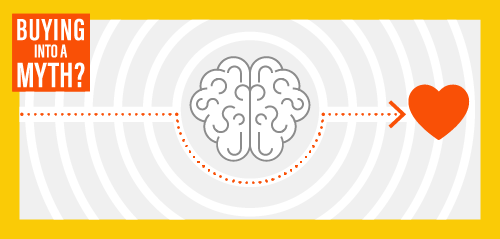BUYING INTO A MYTH?
Marketing Myth #5: B2B campaigns should be rational, not emotional
If you’ve worked in B2B, you’ve undoubtedly heard this wisdom: rational arguments work better than emotional ones on B2B buyers. After all, they’re not buying for themselves. They’re buying for their organizations, so they must justify their decisions with logic, facts and data. But do rational campaigns really perform better?
Settling the debate
Marketing data scientists Les Binet and Peter Field weighed in on the matter by studying the effectiveness of almost 50 B2B campaigns submitted for awards on marketing effectiveness.
Their study, building on a previous one that reviewed nearly 1,000 B2C cases, examined how effective B2B campaigns were at producing very large business effects (profit, sales, market share, loyalty, etc.). They came to a striking conclusion…
The heart wins over the head
7X more effective
B2B campaigns employing emotional strategies outperform those using rational strategies in producing large impacts on the business.1
Where rational excels – and doesn’t
While rational campaigns may not have the far-reaching effects of emotional ones, they do have a place – short-term sales activation, where active buyers will be receptive to useful messaging about product features. This holds true in B2C as well as B2B.
Where rational persuasion falls short is in boosting brand perception. “Brand building requires talking to people before they come to market,” Binet and Field explain. “These people are much less interested in product information right now, so they either screen product messages out or quickly forget them.”
“As B2B marketers, we are not selling to glass buildings, we are selling to people.”
— Ken Bracht, Global Director of Brand Marketing, Indeed.com
The importance of brand-building in B2B is growing
Based on recent trends, the strength of your brand may determine whether you get a foot in the door. “As buyers are becoming more self-directed, doing a lot of their own research… the name of the game is really brand,” said Peter Weinberg, Global Lead at LinkedIn’s B2B Institute.2
A recent Bain study underscored this point. It found that 9 of 10 B2B brands ultimately chosen by buyers were being considered on day one of the purchase journey.3 So, if B2B marketers don’t build their brands, they may never have the chance to sell their products.
Short-term vs. long-term thinking
Hesitant about investing in more emotional B2B campaigns? That’s certainly understandable – it’s a break from the established approach of differentiating products/services with proof points.
But, as Binet and Field point out, such rational approaches are “not very effective as top-of-funnel strategies; and therefore, they are weaker long-term growth drivers.”
If you’re thinking bigger picture, it may be time to rethink your marketing investments. Let’s talk ›
1 Les Binet, Peter Field and LinkedIn B2B Institute, “The 5 Principles of Growth in B2B Marketing: Empirical Observations on B2B Effectiveness,” November 2019
2 LinkedIn B2B Institute webinar, “The Principles of Growth in B2B Marketing”
3 Harvard Business Review, “What B2Bs Need to Know About Their Buyers,” September 2022
Marketing Myth #1: Demand generation is king ›
Marketing Myth #2: Cutting marketing budgets is wise in a recession ›
Marketing Myth #3: Customer loyalty beats customer acquisition ›
Marketing Myth #4: Well-known brands don’t have awareness problems ›
Marketing Myth #6: The purchase funnel is still a thing ›
Marketing Myth #7: Marketing is secondary to sales in B2B ›
Marketing Myth #8: Repeating what works will keep on working ›
Marketing Myth #9: Data-driven is always better than people-driven ›



 See what they have to say
See what they have to say